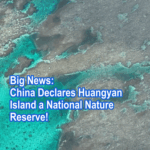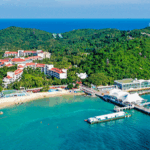For seven years, Bryde's whales—massive oceanic nomads—have turned China's tropical Weizhou Island into their seasonal playground. 🌏 These marine giants, some longer than a school bus, return annually to feast on fish and raise their young, captivating scientists and locals alike.
🔍 Chen Mo, a marine biologist leading research on the island, calls it a "miracle of ecology." His team has logged over 50 whales since 2017, tracking their migration patterns and social behaviors. "The waters here are like a 5-star buffet for them," Chen jokes, pointing to the island's nutrient-rich currents.
🐟 But this isn't just a wildlife spectacle—it's reshaping the island's identity. Once reliant on fishing, residents now champion eco-tourism. "Seeing tourists cry happy tears when a whale surfaces? That changes you," says local guide Lin Wei, who switched from net-mending to leading boat tours.
🌱 The whales' presence sparked grassroots conservation: fishing nets were modified to protect calves, and plastic cleanup drives tripled. "They're not just visitors—they're family," shares retiree Huang Mei, who knits recycled plastic into whale-themed art.
Scientists remain cautiously optimistic. While climate change looms as a threat, Weizhou's story shows how nature's return can rewrite a community's future—one breaching whale at a time. ✨
Reference(s):
cgtn.com



